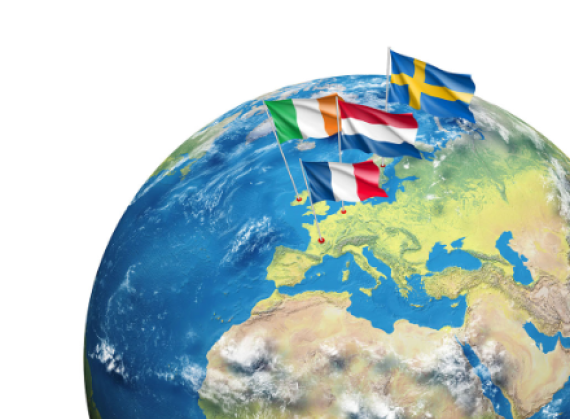After a Bachelor’s in Food Technology at the University of Bologna, Italy, Giulia Fusari came to Wageningen for her Master’s degree in Food Studies. After a few months, she moved to Ireland, only to pack her bags again after eight weeks to go to France. Now she is in Sweden. Fusari is taking the European Master in Food Studies (EMFS), an international Master’s with courses at four European universities.

Giulia Fusari: ‘All that moving around can be tough but it is worth it.’
Why not a regular master’s in Food Techology?
‘During my Bachelor’s degree in Italy, I discovered that I would like to work in production development. But in Bologna, students are primarily educated for an academic career, and there are no good opportunities for a long internship. Then I found out about EMFS, which offers more than just lab work and food law, and a lot more time working in industry.’
How do you like it?
‘I am very happy with it. I chose EMFS mainly for the long internship, which I will do next year at Mars Nederland, but this Master’s is also fantastic for learning to work in a team. It started with a team-building week in August 2018, during which we learned to express ourselves, to listen to others and to respect everyone’s opinion. We also played games to get to know each other. Then we were divided into two groups of eleven, which stay together for the whole of the Master’s. Each team has to develop an innovative product. Although we take all the same courses as students of Food Technology, we work on our group projects at the same time, and we have to present our products in June 2020. So teamwork really is an important component of the programme. And that is great, because collaboration is fundamental in a modern work context.’

Isn’t it tiring to move so often?
‘Yes, EMFS is challenging and sometimes it is heavy going. But it is all worth it. At each university we’ve been to, we learned about other aspects of food technology. Cork was fantastic, also because we had time to travel and see a bit more of Ireland. Paris was very hectic because we had six hours of classes every day, and then we still had to do homework and work on our group project too. On the other hand, the social side of it was very nice there, because we went out every Friday night. Appropriately, we finished that period with a cheese and wine party. After a week’s holiday we got together again, this time in Sweden, ready for a new experience.’
It sounds like a rollercoaster.
‘It is a bit. For me, Wageningen was the toughest period so far, because I was still getting used to working in English, as well as to new methods of study and new people. But when I was packing at Christmas to go to Cork, I noticed that I was really looking forward to embarking on that new adventure with my new friends.’
What’s on the menu in Sweden?
‘In Lund, we’ve been given a group assignment for which we had to use waste products from plant-based milk to develop a new product. It is quite similar to our big team project, only on a smaller scale and with two months to do it instead of two years. My group is working on a fruit spread, and we are doing experiments in the lab at the moment.’
We learn different things at each university
What is the most important thing you’ve learned so far?
In Cork, two representative from each team had to present the ideas to “the board”, a group of representatives of the four participating universities and 11 companies. I had to give that presentation and it caused me quite a lot of stress, because when I started on the Master’s in August, I was quite shy and insecure about my English. But it went well and I was very pleased with myself afterwards. EMFS is helping me to grow as a person by challenging me. That’s what you get if you bring 22 motivated students from all over the world together to learn and travel together and share their ups and downs.’
| EUROPESE MASTER IN FOOD STUDIES |
|---|
| The ‘European Master in Food Studies’ (EMFS) is a joint venture by WUR and the universities of Cork (Ireland), Lund (Sweden) and Agro-Paris Tech (France) and 11 big companies, including Heineken, Nestlé, Unilever and Mars. During their first year, the students are taught at all the participating universities: from September to December in Wageningen, in January and February in Cork, in March and April in Paris, and in May and June in Lund. In their second year they do an internship with one of the industrial partners. The students also work in teams on an innovative product over the entire two years. |

 Illustration: Alfred Heikamp
Illustration: Alfred Heikamp